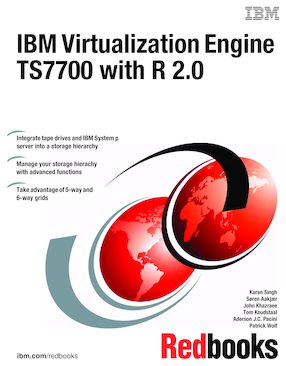
Published on 17 November 2011, updated 20 February 2012
Share this page:
ISBN-10: 0738436097
ISBN-13: 9780738436098
IBM Form #: SG24-7975-00
Authors: Karan Singh, Søren Aakjær, John Khazraee, Tom Koudstaal, Aderson J.C. Pacini and Patrick Wolf
Abstract
This IBM® Redbooks® publication highlights TS7700 Virtualization Engine Release 2.0. It is intended for system architects who want to integrate their storage systems for smoother operation. The IBM Virtualization Engine TS7700 offers a modular, scalable, and high-performing architecture for mainframe tape virtualization for the IBM System z® environment. It integrates 3592 Tape Drives, high-performance disks, and the new IBM System p® server into a storage hierarchy. This storage hierarchy is managed by robust storage management firmware with extensive self-management capability. It includes the following advanced functions:
- Policy management to control physical volume pooling
- Cache management
- Dual copy, including across a grid network
- Copy mode control
- The TS7700 Virtualization Engine offers enhanced statistical reporting. It also includes a standards-based management interface for TS7700 Virtualization Engine management.
The new IBM Virtualization Engine TS7700 Release 2.0 introduces the next generation of TS7700 Virtualization Engine servers for System z tape:
- IBM Virtualization Engine TS7720 Server Model VEB
- IBM Virtualization Engine TS7740 Server Model V07
These Virtualization Engines are based on IBM POWER7® technology. They offer improved performance for most System z tape workloads compared to the first generation of TS7700 Virtualization Engine servers.
Table of Contents
Part 1. Architecture and planning
Chapter 1. Introducing the IBM Virtualization Engine TS7700
Chapter 2. Architecture, components, and functional characteristics
Chapter 3. Preinstallation planning and sizing
Part 2. Implementation and migration
Chapter 4. Hardware implementation
Chapter 5. Software implementation
Chapter 6. Upgrade considerations
Chapter 7. Migration aspects
Part 3. Operation
Chapter 8. Operation
Chapter 9. Performance and Monitoring
Chapter 10. Failover and disaster recovery scenarios
Appendix A. Feature codes
Appendix B. IBM Virtualization Engine TS7700 implementation steps
Appendix C. TS3500 and TS7700 checklists
Appendix D. JES3 examples and information
Appendix E. Case study for logical partitioning of a two-cluster grid
Appendix F. Sample JCL
Appendix G. Library Manager volume categories
Appendix H. DEVSERV QLIB command